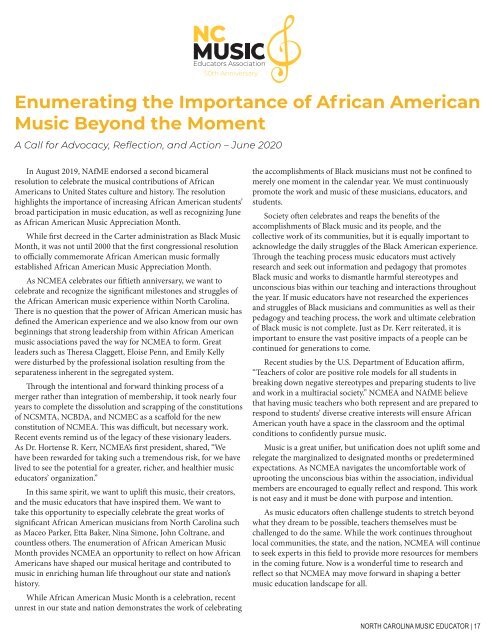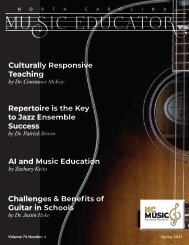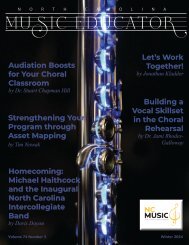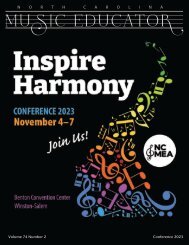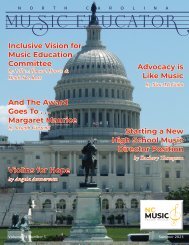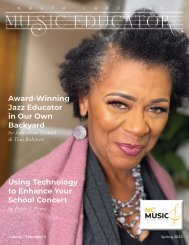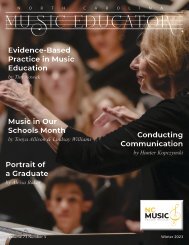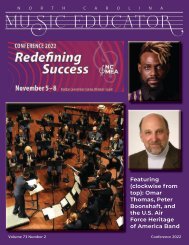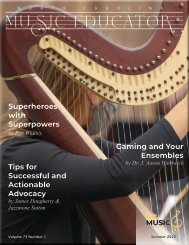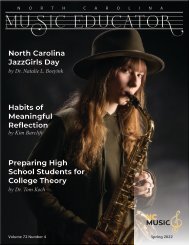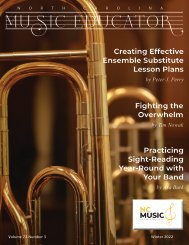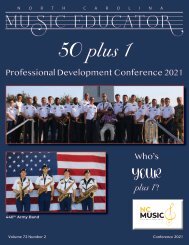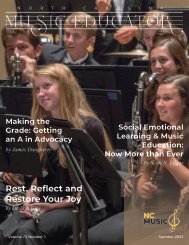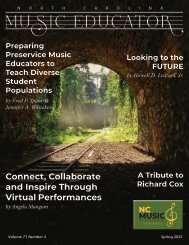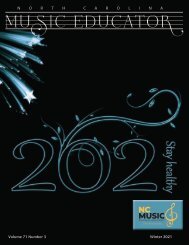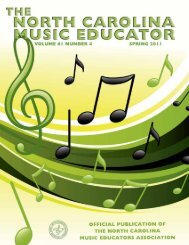NCMEA Summer 2020
North Carolina Music Educators Association Summer 2020 journal
North Carolina Music Educators Association Summer 2020 journal
Create successful ePaper yourself
Turn your PDF publications into a flip-book with our unique Google optimized e-Paper software.
Enumerating the Importance of African American<br />
Music Beyond the Moment<br />
A Call for Advocacy, Reflection, and Action – June <strong>2020</strong><br />
In August 2019, NAfME endorsed a second bicameral<br />
resolution to celebrate the musical contributions of African<br />
Americans to United States culture and history. The resolution<br />
highlights the importance of increasing African American students’<br />
broad participation in music education, as well as recognizing June<br />
as African American Music Appreciation Month.<br />
While first decreed in the Carter administration as Black Music<br />
Month, it was not until 2000 that the first congressional resolution<br />
to officially commemorate African American music formally<br />
established African American Music Appreciation Month.<br />
As <strong>NCMEA</strong> celebrates our fiftieth anniversary, we want to<br />
celebrate and recognize the significant milestones and struggles of<br />
the African American music experience within North Carolina.<br />
There is no question that the power of African American music has<br />
defined the American experience and we also know from our own<br />
beginnings that strong leadership from within African American<br />
music associations paved the way for <strong>NCMEA</strong> to form. Great<br />
leaders such as Theresa Claggett, Eloise Penn, and Emily Kelly<br />
were disturbed by the professional isolation resulting from the<br />
separateness inherent in the segregated system.<br />
Through the intentional and forward thinking process of a<br />
merger rather than integration of membership, it took nearly four<br />
years to complete the dissolution and scrapping of the constitutions<br />
of NCSMTA, NCBDA, and NCMEC as a scaffold for the new<br />
constitution of <strong>NCMEA</strong>. This was difficult, but necessary work.<br />
Recent events remind us of the legacy of these visionary leaders.<br />
As Dr. Hortense R. Kerr, <strong>NCMEA</strong>’s first president, shared, “We<br />
have been rewarded for taking such a tremendous risk, for we have<br />
lived to see the potential for a greater, richer, and healthier music<br />
educators’ organization.”<br />
In this same spirit, we want to uplift this music, their creators,<br />
and the music educators that have inspired them. We want to<br />
take this opportunity to especially celebrate the great works of<br />
significant African American musicians from North Carolina such<br />
as Maceo Parker, Etta Baker, Nina Simone, John Coltrane, and<br />
countless others. The enumeration of African American Music<br />
Month provides <strong>NCMEA</strong> an opportunity to reflect on how African<br />
Americans have shaped our musical heritage and contributed to<br />
music in enriching human life throughout our state and nation’s<br />
history.<br />
While African American Music Month is a celebration, recent<br />
unrest in our state and nation demonstrates the work of celebrating<br />
the accomplishments of Black musicians must not be confined to<br />
merely one moment in the calendar year. We must continuously<br />
promote the work and music of these musicians, educators, and<br />
students.<br />
Society often celebrates and reaps the benefits of the<br />
accomplishments of Black music and its people, and the<br />
collective work of its communities, but it is equally important to<br />
acknowledge the daily struggles of the Black American experience.<br />
Through the teaching process music educators must actively<br />
research and seek out information and pedagogy that promotes<br />
Black music and works to dismantle harmful stereotypes and<br />
unconscious bias within our teaching and interactions throughout<br />
the year. If music educators have not researched the experiences<br />
and struggles of Black musicians and communities as well as their<br />
pedagogy and teaching process, the work and ultimate celebration<br />
of Black music is not complete. Just as Dr. Kerr reiterated, it is<br />
important to ensure the vast positive impacts of a people can be<br />
continued for generations to come.<br />
Recent studies by the U.S. Department of Education affirm,<br />
“Teachers of color are positive role models for all students in<br />
breaking down negative stereotypes and preparing students to live<br />
and work in a multiracial society.” <strong>NCMEA</strong> and NAfME believe<br />
that having music teachers who both represent and are prepared to<br />
respond to students’ diverse creative interests will ensure African<br />
American youth have a space in the classroom and the optimal<br />
conditions to confidently pursue music.<br />
Music is a great unifier, but unification does not uplift some and<br />
relegate the marginalized to designated months or predetermined<br />
expectations. As <strong>NCMEA</strong> navigates the uncomfortable work of<br />
uprooting the unconscious bias within the association, individual<br />
members are encouraged to equally reflect and respond. This work<br />
is not easy and it must be done with purpose and intention.<br />
As music educators often challenge students to stretch beyond<br />
what they dream to be possible, teachers themselves must be<br />
challenged to do the same. While the work continues throughout<br />
local communities, the state, and the nation, <strong>NCMEA</strong> will continue<br />
to seek experts in this field to provide more resources for members<br />
in the coming future. Now is a wonderful time to research and<br />
reflect so that <strong>NCMEA</strong> may move forward in shaping a better<br />
music education landscape for all.<br />
NORTH CAROLINA MUSIC EDUCATOR | 17


